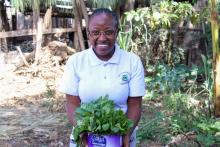
RachelNzulu, 29, is one of 31 trainer that are supporting women farmers in Laikipia, Kitui and West Pokot counties of Kenya. Photo: UN Women/James Ochweri.
From where I stand: “When it comes to climate action, the issue is not the size of land but the utilisation of scarce water sources.”
I got into agriculture because it’s so important in Kenya, it’s one of the government’s priorities. I want to help increase food security in Kenya, and I want to help my community fight poverty which follows from food insecurity.
Most farmers in the local community don’t combine crops and plant in open fields. Using modern materials and techniques will improve productivity, and agri-nutrition – that’s why we’re training communities to build vertical gardens. They require minimal space, they’re cheap, you don’t need large amounts of inputs. It uses water more efficiently; you can use water from the kitchen and recycle it.
In the space of about 2x2m, you can plant around 165 seedlings, that’s a lot of produce, and this can turn into 1,000 plants. One of these gardens can support a family of five. You can spread planting times for even production and harvests all year round.
It is special because you can plant multiple different of crops that are nutritious for your body and you are able to sell surplus vegetables to the community.
Men mostly handle marketing of goods and they’re the ones that get the income. We want to get women involved because they are usually spending time tending to crops and preparing food. They understand these new practices, as they’re largely responsible for providing their families with better nutrition and potential added income.
When it comes to climate action here, the issue is not the size of land but the utilisation of scarce water sources. There is still drought. We always advise to harvest the rain. Despite the level of drought, not anyone can do it. People can’t afford water tanks, guttering for their homes.”
Rachel Nzulu, 29, works for Laikipia County Government’s Department of Agriculture. She is also a Trainer of Trainers for the joint UN Women and Food and Agriculture Organisation project, Economic Empowerment of Women Through Climate Smart Agriculture in Arid & Semi-Arid Central Areas. The project, supported by the Korea International Cooperation Agency (KOICA), reflects Sustainable Development Goal 15, which aims to Protect, restore and promote sustainable use of terrestrial ecosystems, sustainably manage forests, combat desertification, and halt and reverse land degradation and halt biodiversity loss. Nzulu and her team will be working with over 23 community-based self-help groups in Laikipia who want to learn new farming practices. By end of 2023, the project will have reached over 2,400 farmers across three counties.
Topics
- 2030 Agenda for Sustainable Development
- Climate change
- Women farmers